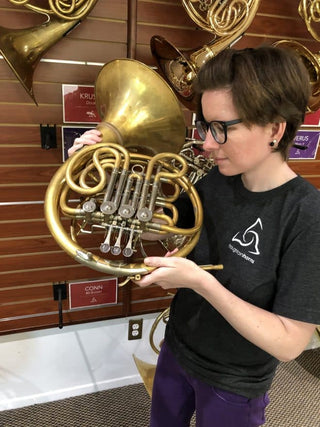
For the budget-conscious musician, shopping pre-owned instruments can get you the same quality for a much lower price. But how do you know you’re choosing the right instrument? Here are some things to look for.
What condition is the instrument in?
Key points to examine on a brass instrument before purchase:
— Are there any dents or corrosion?
Not all spots are created equal. If the instrument is unlacquered brass, there will be brown fingerprints everywhere someone has touched it. This is a normal part of the oxidation process. Over the next couple of years, that horn will develop a dignified golden-brown patina.
If the instrument has red spots, that might be a sign of red rot, or it might simply be oxidation that managed to sneak under the lacquer. Consult a repair technician if you are concerned about the color of any spots on the instrument.
Most dents are purely cosmetic, but some can affect the sound quality or structural integrity of your instrument. We recommend you have dents removed to maintain your instrument in optimal playing condition.
— Are the valves leaky?
Most reputable shops will be able to give you compression readings, which will tell you if there are any leaks too small for the human eye to see. Houghton Horns is happy to give you these readings on request, and we are in the process of posting them online for all of our instruments.
— Do the valves and slides move smoothly?
If an instrument has been sitting unplayed for months it might be a little sluggish until it’s oiled. But if lubricating the instrument doesn’t get things moving within a few minutes, there might be a problem.
Horn players can follow the instructions in the article How Do I Oil My French Horn?
— Has the instrument been regularly cleaned and taken care of?
If the horn has been sitting in the owner’s attic untouched for 20 years, even a thorough ultrasonic cleaning by your trusted repair shop might not be enough to return it to its original play condition. Ask how often the previous owner played it.
Authorized dealers and repair shops are a good place to look for refurbished instruments because they have a reputation for quality to uphold.
If you are buying from an individual, at the very least you should ask for receipts of any ultrasonic cleanings and repair work they have had done. Take it to your repair shop for a consultation during the trial period.
— Is there any sign of previous damage or repair work?
Once a brass instrument has been dented, even the world’s best repair technician can’t restore it to 100%. Smoothed-out dents and patches in the metal will change the resonance of the instrument.
— Is it free-blowing and easy to play?
There should be the proper amount of resistance. Ask yourself if you would be comfortable playing this instrument for hours at a time, or whether you’d be working yourself to death.
The upper register should be free and easy. The lower register should be rich and vibrant.
— Does it have unexpected intonation problems?
We’re not talking about the usual intonation trouble spots (such as low D, C#, and fourth space E for trumpet players). If you play a few scales and find some notes are weirdly out of tune, maybe pass on this instrument.
Houghton Horns can give you intonation readings on any instrument upon request, and we are working to post the readings for every one of our instruments on our website.
— Can you move flexibly between slurred notes?
Bring some sheet music you are very familiar with to try on the instrument. A new instrument should enhance your technique, not hamper it.
— Is it comfortable to play?
Can your hand reach all of the valves and pinky hook without strain? If they can’t, can anything on the instrument (pinky hook, flipper, etc.) be adjusted to fit your hand better? Can your teacher or a friend recommend a strap or grip that will make the instrument easier to hold?
If all else fails and you really love the instrument, your local repair shop may be able to move the pinky hook and other parts around to better fit your hand. If you want to go that route, be sure to factor that cost into the purchase price. But at any rate, don’t buy an instrument that will be painful to hold for hours on end.
Just because the instrument isn’t comfortable for you at first, that’s not necessarily a bad sign. A new instrument may take a few weeks to start feeling natural to you, especially if you are jumping up from a school horn to a more expensive one. Professional instruments require a higher volume of air and a higher degree of control than beginner instruments, and the step up can be difficult for less experienced players.
Bringing your teacher along to trial instruments with you, or FaceTiming them during the trial, may be helpful in deciding whether there is a genuine issue with the instrument, or whether it will grow more familiar to you with practice.
— Most importantly: Do you like the way it sounds?
Will you enjoy practicing with this instrument every day? Even if it may feel strange to your hands and lips until you get used to it, does it make you sound good?
There’s no rush
Spend plenty of time shopping around before you purchase. Try multiple instruments.
If a seller is too aggressive or too desperate to make the deal that same day, consider that a red flag. No seller who wanted a happy long-term relationship with their customers would rush them into making an unwise decision.
What happens if it’s not working out for you?
Read the terms and conditions before you buy. Legitimate sellers should offer:
— a trial period
— a return policy
— a warranty
If the seller insists that all sales are final, and you might not be able to contact them again if there is a problem with your instrument, don’t trust them with your money.
Is this instrument what you really need, or just cheap?
Five years from now, will you be happy you saved $500 buying from a stranger on Craigslist, if the slide sticks and the valves leak? A brass instrument is a considerable investment that should serve you well for years. As the old adage goes, if the price looks too good to be true, it probably is.
It’s better to buy the right instrument the first time than have to buy a second instrument soon after.
Don’t be afraid to walk away
Sometimes people get attached to an instrument before they find out it exceeds their budget, so they sign the contract anyway, to their later regret. Try saving up for a few months – if you still love that model three months later and can’t imagine playing anything else, that’s when you know you’ve made the perfect choice! Wherever possible, we recommend saving up and buying an instrument outright, because that will save you hundreds of dollars in interest.
If a loan will be necessary, you can check out our financing options here. After you’ve set a tentative budget, you might also want to ask your personal bank for financing options, because a bank that already has a relationship with you might be willing to give you better terms than a bank that does not know you. Have an idea of how financing will affect your budget before you get too far into the shopping process.
Sometimes customers feel too embarrassed to tell the sales staff that a purchase is beyond their budget at the moment, and this leads them into unwise financial decisions. Don’t stress about telling the salesperson that you will need to save up before purchasing. If the business is legitimate, they have seen this happen a thousand times before and will be happy to say goodbye for now and check in with you later. If they get angry or pushy, you probably don’t want to be doing business with them anyway.
Other considerations
Don’t forget to factor shipping and sales tax into your budget when shopping. If you are shipping the instrument internationally, tariffs and customs duties may apply.
Pre-owned instruments often come with cases, but they are generally in poor condition. Don’t expect a 15-year-old factory case to keep your instrument safe in a serious accident. You may need a new case for a used instrument.
For sanitation reasons, we recommend tossing out any mouthpieces that come with pre-owned instruments. Even if your new-to-you instrument doesn’t come with a mouthpiece, many musicians prefer to change mouthpieces at the same time to better fit the instrument. You might want to add a new mouthpiece to your budget as well.
Once you add in sales tax, shipping, customs, a case, and a mouthpiece, a $3,500 trumpet could easily become $4,000. We recommend keep a spreadsheet in Excel or Google Drive where you can compare all of the various ancillary costs associated with the instruments you are considering.
Ready to start looking?
Okay, so you’ve got a spreadsheet set up and a new browser tab open? Check out instruments on our online shop or schedule an instrument trial appointment. Happy shopping!

